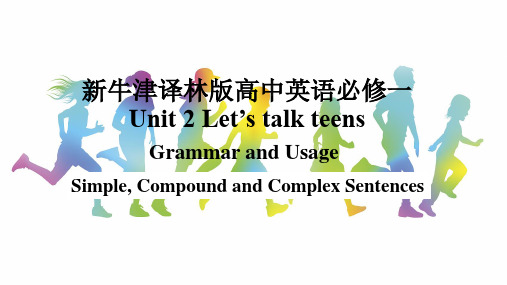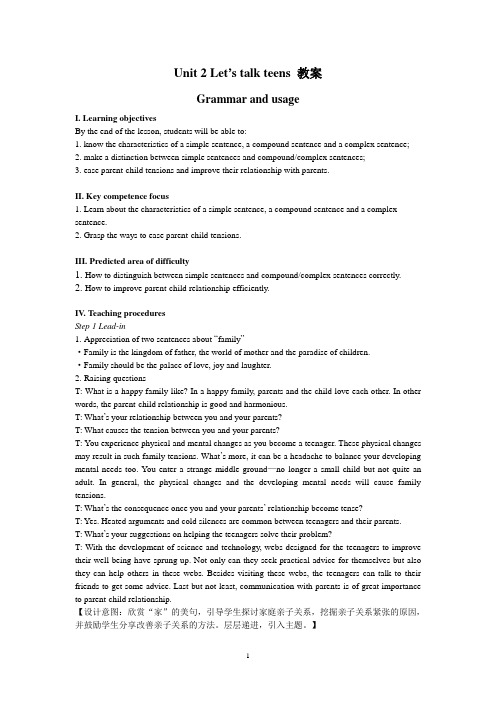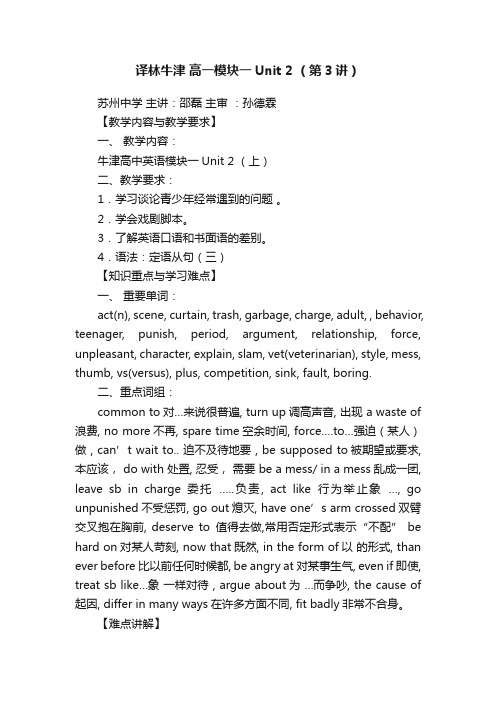牛津高中英语 牛津版 译林版 高一 模块一 Unit2 sUnit 2 Growing Pains 教案
高中英语 _ 牛津译林版 _ 高一上册 _ 模块1 Unit 2 Growing painsroje

• 3 kinds of growing pains:
1: physical changes 2: psychological changes 3: how to fit in society
grow taller
voice get deeper
fat VS thin
I want to fly
高 中 英 语 _ 牛 津 译 林版 _ 高 一 上 册 _ 模 块 1 U nit 2 G r ow ing p a insroj ectPPT 课堂课 件(1)_ w riti ng a r e port o n g ro wing p a ins P P T课堂 课件(2 4页)-精 品PPT 课件
I want to be loved I prefer alone
高 中 英 语 _ 牛 津 译 林版 _ 高 一 上 册 _ 模 块 1 U nit 2 G r ow ing p a insroj ectPPT 课堂课 件(1)_ w riti ng a r e port o n g ro wing p a ins P P T课堂 课件(2 4页)-精 品PPT 课件
II.Divide the text into three parts and get the main idea of each part
新牛津译林版高中英语必修一Unit2Let'stalkteens-GrammarandUsage课件

Although the place is quite pleasant, we should not go there all the time.
Let’s summarize
2.疑问句: 提出问题,有以下四种: (1)一般疑问句 Can you finish the work in time? (2)特殊疑问句 Where do you live? (3)选择疑问句 Do you want tea or coffee?
(4)反意疑问句 He doesn't know her, does he? 3.祈使句: 提出请求、建议或发出命令。 Sit down, please.
2. 表示选择关系的并列句,常见的连接词有:or, either ... or, otherwise等;
3. 表示转折和对比关系的并列句,常见的连接词有:but, while, yet, still, however等;
4. 表示因果关系的并列句,常见的连接词有:for, thus, so, therefore等。
E.g. These habits will be helpful.
句子中只有__一__个___主语(或并列主语)和__一__个___谓语(或并列谓语),
句子的各个成分都是由单词和短语充当。
简单句按使用目的可分为陈述句、疑问句、祈使句和感叹句。
1.陈述句: 说明一个事实或陈述一种看法,有肯定句和否定句之分。 She is fond of collecting stamps. He doesn't want to meet me.
高一知识清单译林牛津版 Module 1 Unit 2 Growing pains

Module 1 Unit 2 Growing painsWelcome & Reading一、重点短语1. grow up 长大成人;成长2. turn up 出现,开大音量3. be home 到家4. a waste of time 浪费时间5. earlier than expected 比预料的早6. can’t wait to do sth 迫不及待做某事7. be supposed to 应当做某事8. followed by 后面跟着9. be gone 不见;消失;丢失10. all over 遍及11. in a mess 乱七八糟12. be on vacation 在度假13. in the corner 在角落里14. a garbage can 垃圾箱15. pieces of 一片片的16. in charge (of)负责17. act like 充当;当任18. make decisions做决定19. tolerate such behavior容忍如此行为20. shout at向…吆喝21. as lights go out 当灯光熄灭时22. give sb a chance给某人机会23. have an emergency 遇有紧急情况24. deserve an explanation值得解释25. take sb to the clinic 带某人就医26. have no time to do没时间做27. be too hard on sb对某人太苛刻28. be rude to sb对某人粗鲁二、重点句型1. We thought you could act like an adult, but look at the mess!2. Daniel has his arms crossed and looks upset.3. The money for dog food is gone, but Spot looks like he is starving.4. Maybe, but now that he has been so rude to us, I feel like we have to punish him or he won’t respect us.5. We won’t tolerate such behavior in our house.6. There is probably a good explanation for everything, but you are not supposed to act that way.7. Daniel has his arms crossed and looks upset.8.Anyhow, next time we were on vacation, if you have an emergency like this you should call us.Word power, grammar & task一、重点短语1. differ in many ways 在很多方面不同2. shopping centre购物中心3. a piece of cake 小菜一碟4. a wet blanket扫兴的人或物5. make friends with与某人交朋友6. in the past在过去7. go to the cinema去看电影8. go to sleep入睡9. make sb upset使某人不安10. a little bit expensive稍微有点贵11.be nervous about对…感到紧张12. make an error出差错13. insist on doing坚持做某事14. get along with相处;进展15. get annoyed 生气的16. all ears 全神贯注地听17. pull one’s leg开玩笑18.have green fingers 绿手指;园艺能手19. the top dog 胜利者;主要人物20. give sb the cold shoulder冷眼相待21. rain cats and dogs下倾盆大雨22one’s cap of tea某人钟爱之物二、重点句型1. However , I am worried that if I keep allowing him to do what he want he wants, he may fail at school, or worse.2. The way (that/ in which) he teaches English is interesting.3. Dad is a person whom /that /who I can easily talk to.4. The study is the place where/ in which I often have talks with my father.5. He even forbids me from chatting with my friends in the Internet café! Project一、重点短语1. feel lonely感觉寂寞2. in other ways在别的方面3. out of control失去控制4. go through经历;经受5. become confused with对…感到困惑6. psychological changes心理变化7. in this regard在这一方面8. part of the group群体的一部分9. fit in society适应社会10. be traded for与…交易二、重点句型1.. This feelings are a common part of adolescence——the time of lifebetween child and adult.2. These feelings can be thought of as growing pains——the difficulties thatteenagers face as they grow to adults.3. At the same time, girls often want someone——anyone——to talk to,, asthey try to deel with their strong feelings.4. In the social world, as teenagers get older, they struggle to depend on themselves.5. The good news is that these kinds of growing pains do not last.。
译林牛津高中英语模块一第二单元 Growing pains

句法与语法突破
explain unexplained
21. rude
rudely rudeness 22. guidance
guide
基础知识排查
高频考点
基础知识排查
23. argument /ɑː ɡj um ənt /n . 争吵,辩论;论点论据→
argue
24. harm 25. patience 有耐心的 26. selfish → self
To be honest,it was Su’s fault,but Li was also to blame. 说实话,那是苏的错,但李也该受责备。 (2012· 江苏· 书面表达)
基础知识排查
重点单词突破
重点短语突破
句法与语法突破
高频考点
重点单词突破
【词义辨析】 fault,mistake (1)fault多指性格上的弱点,行为上的过失,强调因过 失所导致的应负的责任。 (2)mistake指“错误;误会;误解”,多指缺乏正确 理解造成行动上或认识上的错误。
基础知识排查
重点单词突破
重点短语突破
句法与语法突破
高频考点
重点单词突破
【夯实基础】 用适当的介、副词填空 (1)He frightened the old lady into them signing the paper. (2)He threatened the intruders with a gun and frightened
基础知识排查
重点单词突破
重点短语突破
句法与语法突破
高频考点
重点单词突破
语境填词——常用单词自测
1.The girl was
新牛津译林版必修第一册Unit 2 Let's talk teens Grammar and u

Unit 2 Let’s talk teens 教案Grammar and usageI. Learning objectivesBy the end of the lesson, students will be able to:1. know the characteristics of a simple sentence, a compound sentence and a complex sentence;2. make a distinction between simple sentences and compound/complex sentences;3. ease parent-child tensions and improve their relationship with parents.II. Key competence focus1. Learn about the characteristics of a simple sentence, a compound sentence and a complex sentence.2. Grasp the ways to ease parent-child tensions.III. Predicted area of difficulty1. How to distinguish between simple sentences and compound/complex sentences correctly.2. How to improve parent-child relationship efficiently.IV. Teaching proceduresStep 1 Lead-in1.Appreciation of two sentences about “family”·Family is the kingdom of father, the world of mother and the paradise of children.·Family should be the palace of love, joy and laughter.2.Raising questionsT: What is a happy family like? In a happy family, parents and the child love each other. In other words, the parent-child relationship is good and harmonious.T: What’s your relationship between you and your parents?T: What causes the tension between you and your parents?T: You experience physical and mental changes as you become a teenager. These physical changes may result in such family tensions. What’s more, it can be a headache to balance your developing mental needs too. You enter a strange middle ground—no longer a small child but not quite an adult. In general, the physical changes and the developing mental needs will cause family tensions.T: What’s the consequence once you and your parents’ relationship become tense?T: Yes. Heated arguments and cold silences are common between teenagers and their parents.T: What’s your suggestions on helping the teenagers solve their problem?T: With the development of science and technology, webs designed for the teenagers to improve their well-being have sprung up. Not only can they seek practical advice for themselves but also they can help others in these webs. Besides visiting these webs, the teenagers can talk to their friends to get some advice. Last but not least, communication with parents is of great importance to parent-child relationship.【设计意图:欣赏“家”的美句,引导学生探讨家庭亲子关系,挖掘亲子关系紧张的原因,并鼓励学生分享改善亲子关系的方法。
译林牛津高一模块一Unit2(第3讲)

译林牛津高一模块一Unit 2 (第3讲)苏州中学主讲:邵磊主审:孙德霖【教学内容与教学要求】一、教学内容:牛津高中英语模块一Unit 2 (上)二、教学要求:1.学习谈论青少年经常遇到的问题。
2.学会戏剧脚本。
3.了解英语口语和书面语的差别。
4.语法:定语从句(三)【知识重点与学习难点】一、重要单词:act(n), scene, curtain, trash, garbage, charge, adult, , behavior, teenager, punish, period, argument, relationship, force, unpleasant, character, explain, slam, vet(veterinarian), style, mess, thumb, vs(versus), plus, competition, sink, fault, boring.二、重点词组:common to对…来说很普遍, turn up调高声音, 出现 a waste of 浪费, no more不再, spare time空余时间, force….to…强迫(某人)做, can’t wait to.. 迫不及待地要 , be supposed to被期望或要求, 本应该, do with 处置, 忍受,需要 be a mess/ in a mess乱成一团, leave sb in charge 委托…..负责, act like行为举止象…, go unpunished不受惩罚, go out熄灭, have one’s arm crossed双臂交叉抱在胸前, deserve to值得去做,常用否定形式表示“不配” be hard on对某人苛刻, now that既然, in the form of以的形式, than ever before比以前任何时候都, be angry at对某事生气, even if即使, treat sb like…象一样对待 , argue about为…而争吵, the cause of 起因, differ in many ways在许多方面不同, fit badly非常不合身。
高中英语 _ 牛津译林版 _ 高一上册 _ 模块1 Unit 2 Growing painsproj
•The teacher treats us as if we __w__e_r_e___(be)
all his own children.
•He talked as if he __h_a_d___ (travel) there
himself.
traveled
•When a pencil is partly in a glass of water, it
•A. be; be delayed B. is; delay
•C. should be;be delayed
as if
It looks as if __i_t_i_s_g__o_in__g_t_o__r_ai(n天好像要下雨
了。)
He opened his mouth as if hew_a__s_g__o_in__g__to_ say
_l_im__it_e_d______ (adj.) to doing sth
语境活用
• 1.No one can _t_o_l_e_r_a_te__ being laughed at
in public.
• 2.With a little bit of __p_a_t_ie__n_c_eand
communication, many of the conflicts between parents and children can be solved.
高中英语 _ 牛津译林版 _ 高一上册 _ 模块1 Unit 2 Growing painsprojectPPT课堂课件(1)_ writing a report on growing painsPPT课堂课件(22页)-精品PPT课件
请你归纳 (as if )
牛津译林版英语高一上册Module 1《Unit 2 Growing pains》
Unconditional love is very important, because he is your son.
problems the father thinks about his son
• disobeys everything his parents ask him to do • is rude to them • refuses to spend time with them • refuses to do his homework
Remember what your son needs is more than material comfort. You’d better not put too much pressure on your son. Be a good motivator. Try to encourage him to find himself, to build up self-confidence. Cut out harsh remarks when your son falls short of your expectation.
Project 1
an advice columnist
get a rough idea about the trouble analyze the trouble find out the roots of the trouble give proper suggestions keep in regular contact with the sender
Homework:
Get ready to write an advice letter.
Work in groups of 4 and find suggestions to the father.
高中英语 牛津译林江苏高一必修第一册Unit2 Let's talk teens词汇精讲
江苏译林版高一必修第一册Unit2词汇讲解(新教材)nest n. 鸟窝,鸟巢,巢穴,窝v. 筑巢,巢居I can see an eagle's nest on the rocks.我能看到岩石上的鹰巢。
Some species may nest in close proximity to each other. 一些鸟类会彼此紧挨着筑巢。
roof n. 屋顶,顶部the roof of... ...的顶部The roof of the car was not damaged in the accident. 事故中,车顶没有遭到损坏。
I am just thankful that we have a roof over our heads. 我们有地方住我就很感激了。
battle n. / v. 争论,战斗,战役,搏斗,争斗A battle is a violent fight between groups of people, especially one between military forces during a war.Thousands of people battled with police and several were repo rtedly wounded数千人与警方发生冲突,据报道有数人在冲突中受伤。
see eye to eye with sb. on sth. (在某事上)与某人看法一致He doesn’t see eye to eye with his brother about this matter. 在这个问题上他和他哥哥看法不一致Mike and his father don’t see eye to e ye on the issue.Mike和他老爸在这个问题上没有达到一致。
keep an eye on...照看,留意keep an eye out for 密切注意argue argument argue v. 争吵,争论,争辩,说理,论证argue with ab about sthWe're always arguing with each other about money. 我们总是为钱吵嘴。
牛津译林 必修第一册 单词分层解析二 Unit 2 Let‘s talk teens
1.argument n.争吵, 争论, 论点, 论据【课文原句】Heated arguments and cold silences are common between teenagers and their parents.青少年和他们的父母之间经常会有激烈的争论和冰冷的沉默。
【常用搭配】①have an argument with sb.about / over sth.为某事与某人争吵②get into an argument 争吵起来③avoid an argument 避免争吵Probably the worst thing about being a penguin is after you’re in an argument you’ll try to waddle away angrily but still look adorably cute.身为企鹅最糟糕的一点也许是, 一场激烈的争吵之后, 你试图摇摆着愤然离开, 而在别人眼中仍是一个小可爱。
【联想词】argue v.争论, 争吵, 论证, 争辩argue with sb.与某人争辩argue about / over sth.为某事争论➢argue against / for (doing)sth.争辩反对/ 据理力争(做)某事What do you usually argue about with your parents? 你通常因为什么和你的父母争吵呢?2.anxious adj.忧虑的, 担忧的, 令人焦虑的, 渴望的【课文原句】You may feel anxious that you are developing at a different rate to your friends, shooting up in height or getting left far behind.你可能会感到焦虑,因为你的成长速度与你的朋友不同,你的身高在猛增,或者远远落后(于你的朋友).【常用搭配】①be anxious about sth.担心某事②be anxious for sb.为某人担心③be anxious for sth.渴望得到某物④be anxious (for sb.) to do sth.渴望(某人)做某事⑤be anxious that…忧虑/ 渴望➢We are anxious about his safety.我们担心他的安全。
- 1、下载文档前请自行甄别文档内容的完整性,平台不提供额外的编辑、内容补充、找答案等附加服务。
- 2、"仅部分预览"的文档,不可在线预览部分如存在完整性等问题,可反馈申请退款(可完整预览的文档不适用该条件!)。
- 3、如文档侵犯您的权益,请联系客服反馈,我们会尽快为您处理(人工客服工作时间:9:00-18:30)。
Teaching plan for Unit 2 “Growing Pains”
Period 1 Welcome to this unit
Teaching objectives:
◆To introduce and develop the theme of growing pains.
◆To develop speaking ability by talking about families and problems that happen between
teenagers and parents.
◆To know more about classmates and their families.
Important and difficult points:
◆Get students to understand what growing pains means.
◆Make students know the relationship between parents and their teenage children in the USA.
◆Help students to form a positive attitude towards relationships between their parents and
them.
Teaching procedures:
Step 1 lead-in
Present family albums:
In this part, Ss are encouraged to say something about their families by showing the class pictures with their parents.
Who may have growing pains?
What are Growing pains?
When do they probably have growing pains?
How do you solve this problem?
Growing pains aren't a disease. You probably won't have to go to the doctor for them. But they can hurt. Usually they happen when kids are between the ages of 3 and 5 or 8 and 12. Growing pains stop when kids stop growing. By the teen years, most kids don't get growing pains anymore. Growing pains also mean the troubles and difficulties that teenagers meet when they grow up. Step 2 Brainstorming
Do you love your parents?
Do you always show respect to your parents?
Have you ever quarreled with your parents?
What is your quarrel about?
Step 3 Picture discussion
Ask Ss to look at the pictures and discuss each picture in groups of four.
Picture 1
What does the boy do?
What is the mother doing? How is she probably feeling?
What feelings may the boy have?
Picture 2
What happens to the girl with a bag?
What did her parents ask her to do?
Can you guess what might have happened to her?
What will she do?
Picture 3
Why are the boys and girls around the pretty lady?
What does the boy want to do? Is he allowed to do so? Why or why not?
What feelings may the boy have?
Picture 4
What is the boy probably doing?
Did the boy do well in his exams?
How does his mother feel about the score?
What feelings may the boy have?
Step 4 Picture discription
Imagine the situations and try to describe each picture as fully as possible with their own words. Make sure that Ss have “when”, “where”, “who”, “what” in your descriptions.
Invite some Ss to report back their descriptions.
Sharing opinions (group work)
In this part, Ss discuss the following questions in groups of four. Each group chooses two of the four questions. Have Ss to report their opinions in class.
Step 4 Further Discussion
Discuss the following questions in groups of four.
What do you do when you have family arguments with your parents?
Do you think there is a generation gap between you and your parents? If so, what is the best way to solve the problem?
Homework
1 Preview the Reading part.
2 Describe an unpleasant experience with your friends/teachers.。
